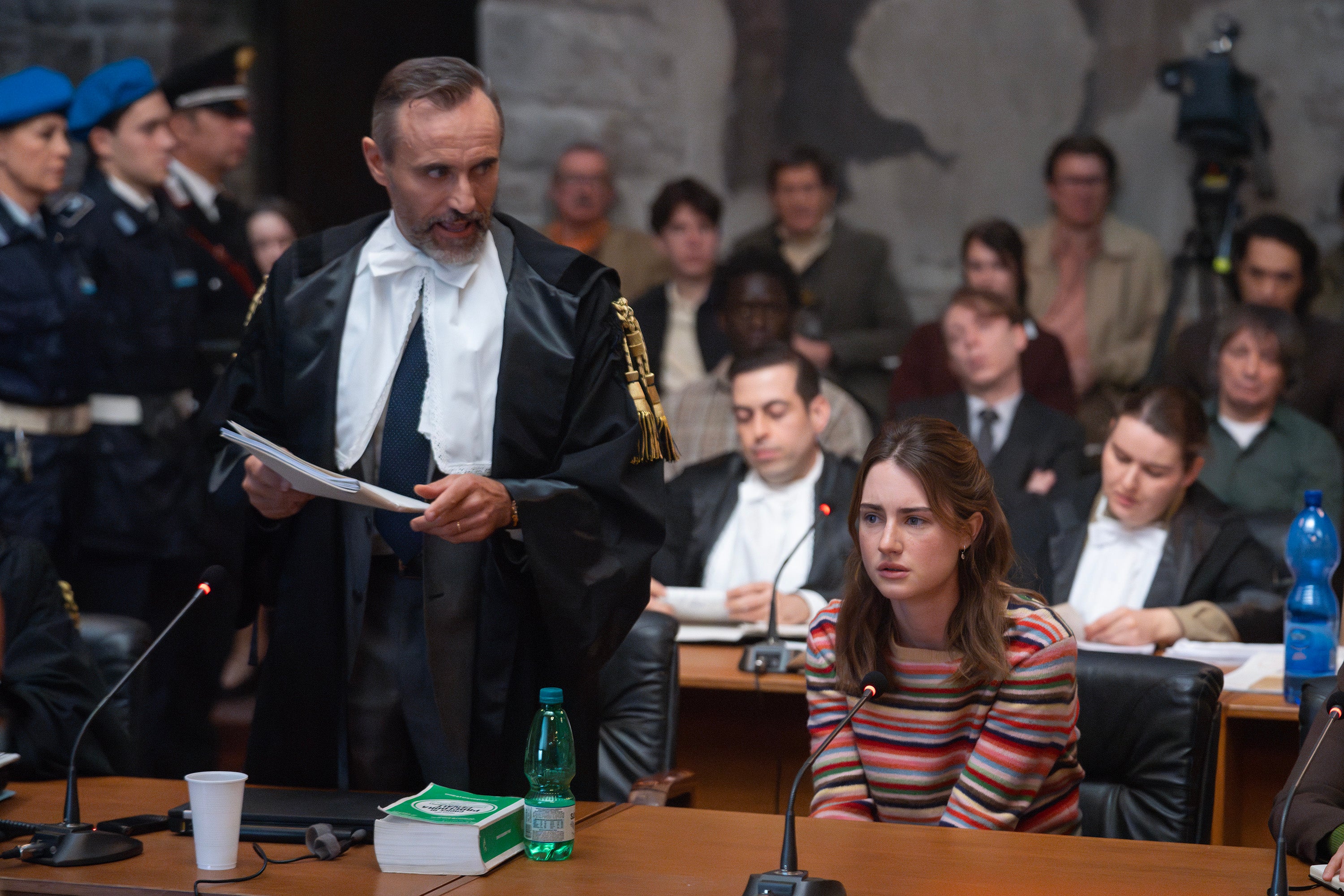“An Italian murder trial is quite unique,” we’re informed, as prosecutors, witnesses and jurors materialise on screen in Disney+’s new series, The Twisted Tale of Amanda Knox. That’s undoubtedly true from an American perspective, and that’s precisely what we're getting here. Part travelogue, part bildungsroman and part courtroom drama, it is a novel take on one of the 21st century’s most overtold stories: the 2007 murder of Meredith Kercher and the conviction, and subsequent release, of her roommate, Amanda Knox.
Amanda Marie Knox (Grace Van Patten), a vivacious young woman from Seattle, thirsts for adventure. “Vieni qui,” a poster for an Italian exchange programme implores her. “Come here!” And so, she jets off to Perugia for a study abroad programme. There she finds work in a bar, friendship with the locals and expats, and romance with a gentle computer science student, Rafaele Sollecito (Giuseppe De Domenico). This Italian idyll is shattered when one of her flatmates, British student Meredith Kercher (Rhianne Barreto), is found murdered in their shared apartment. Knox, distressed by the loss of her friend, quickly becomes the investigation's prime suspect and the focus of an incendiary press campaign, which turns her into “Foxy Knoxy”, a globally recognisable femme fatale.
The Twisted Tale of Amanda Knox is, as Knox’s narration tells us, a chance to correct her “often mistold and madly twisted tale”. The real Knox – who executive produces this series, which draws heavily from her books, Waiting to be Heard: A Memoir and Free: My Search for Meaning – undoubtedly suffered through something traumatic at the hands of both the legal system and the tabloid media. But there’s always been a tension there. Ultimately, she has gone on to a successful career and a happy marriage, whereas the victim, Kercher, is often minimised in retellings of this story. Her sister, Stephanie Kercher, has said she finds it “difficult to understand” why Disney+ are making another adaptation of this case. Twice before, the murder has served as the inspiration for films (Michael Winterbottom’s The Face of an Angel and Tom McCarthy’s Stillwater), both of which focus largely on Knox. And in 2016, Netflix released a major documentary about the case. It was called, simply, Amanda Knox.
So, The Twisted Tale of Amanda Knox knew that it was swimming in morally murky waters. The series was originally supposed to be called Blue Moon, but transitioned to its rather twee title ahead of release. And that should give some indication about the unusually bubbly tone of this eight-part series. “Full of hope, curiosity and the naivety of youth, I embarked on my romantic Italian adventure,” Knox informs audiences, like she’s setting up an episode of Amanda in Perugia. The series leans heavily on these voiceovers to explain Amanda’s quirks (such as providing an impromptu gymnastics display at the police station or wearing a T-shirt to court bearing the slogan “All you need is love” in all caps). The show's visual flourishes – like a juror juggling computer-generated ears to illustrate their exposure to inadmissible evidence – mirror its goofy, confident protagonist. It also makes the tone of the series very distinct from the grim BBC procedurals we’re used to in Britain, owing a debt of gratitude to schlocky tastemaker Ryan Murphy (creator of the American Horror Story anthology series). Above all, the creative decisions are oddly reminiscent of another Disney show, Only Murders in the Building.
This is a bold choice, because the subject matter here is pitch black. The series unapologetically takes Knox’s side (she’s a producer, after all, alongside Monica Lewinsky, another woman subjected to painful media intrusions), dramatising events that have always been ambiguous. Knox’s claims about her treatment by Italian police have been the subject of frenzied debate, but The Twisted Tale of Amanda Knox decisively portrays her as a naif, swept up in a system with a contemptuous fixation on her sex life. This sympathetic rendering means that the most controversial moment in the investigation – Knox’s confession and implication of her Congolese boss, Patrick Lumumba (Souleymane Seye Ndiaye) – is stripped of its fraught racial implications. “Does truth actually exist if no one believes it?” she asks. Yet perhaps a more pressing question is: does truth actually exist if it means different things to different people?
Series creator KJ Steinberg – previously a writer on This is Us and Gossip Girl – has decided to focus on correcting the narrative on Knox, rather than agonising about the mystery of Kercher’s death. The coquettish Van Patten makes for a compelling victim, but she lacks the enigmatic charisma of the real Knox, which made her a target for such outlandish speculation. But what Steinberg and Van Patten nail is the extent to which the bilingualism of the investigation bamboozled Knox and her parents (played by Sharon Horgan and John Hoogenakker). The series moves in a swirl of rapid-fire Italian, with Knox battling through phrasebook sentences, attempting to make herself heard. It offers something that is rare in a series, so absolute in its convictions: genuine insight.

For the most part, however, The Twisted Tale of Amanda Knox serves only to deepen the voyeuristic mythology around its subject. “The family deserve more than justice,” an investigator concludes. “They deserve the truth.” But, 18 years on, the story feels more focused on nostalgia than any real truth. We peer in, once again – but propping open the door only denies the possibility of closure.







